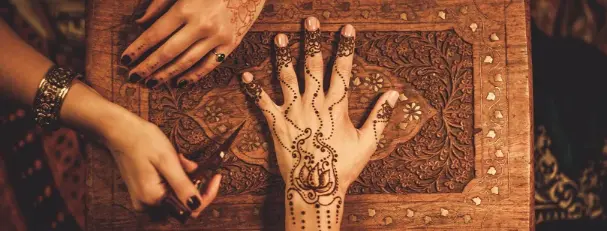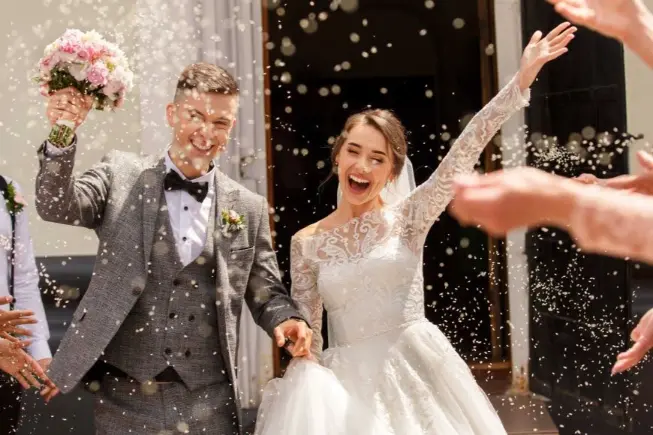Deeply ingrained in Turkish society, a Turkish ceremony marks the uniting of two people and their families. These weddings highlight the core of traditional Turkish wedding customs, not only events. From pre-wedding ceremonies to post-wedding festivities, every action entails close involvement from friends and relatives.
A wedding tradition in Turkey is a happy occasion combining exuberant celebrations, family participation, and old customs. Throughout the celebration, single women, seniors, and the mother-in-law each play different roles. From the formal reception to the henna night at the family house, every element captures a different aspect of Turkish culture.
Using music, dance, and eating to unite everyone, the wedding celebration emphasizes harmony and shared delight. A Turkish wedding creates lifelong memories for the couple and all guests by deftly blending custom with celebration.
Pre-Wedding Traditions and Rituals
- Kız İsteme (Asking for the Bride’s Hand)
Kız İsteme, a ceremonial gathering between the bride’s and groom’s friends and family, starts a wedding in Turkey. Visiting the bride’s family, the groom’s family formally requests her hand in marriage. This significant gathering symbolizes Turkish wedding customs. The bride offering coffee to the guests is one of the main ceremonies. She puts salt in the groom’s coffee as part of this custom to see his endurance. This is a lighthearted but essential portion of the ceremony since the mother-in-law observes this moment. Organizing this custom at the family house signals the start of a happy road and fosters ties among family members.
- Söz Kesme (Promise Ceremony)
The Turkish wedding proceeds with Söz Kesme, the Promise Ceremony, in front of the couple’s family, where they exchange rings. Tied around the rings, a red ribbon stands for unity and dedication. Often the Mother in Law, a family member cuts the ribbon to represent the official commitment. In Turkish wedding customs, this event is rather important. Friends and relatives are gathering here to celebrate the couple’s first step towards marriage.
- Engagement Party (Nişan)

Gathering the wedding party and extended friends and relatives, the engagement party, or Nişan, is a vibrant celebration. Usually playing a significant part in assisting the bride get ready for the celebration are single women. The pair gifts jewelry to the bride during this event. Following traditional Turkish wedding customs, music and dance presentations occur. Having the celebration at the family house guarantees a close atmosphere that guarantees everyone feels part of the happy event.
The Henna Night in Turkey (Kına Gecesi)

- Meaning and Symbolism of Henna
One of the most poignant events in each Turkish wedding is the henning night, sometimes known as Kına Gecesi. Turkey has a significant wedding custom that stands for good fortune, protection, and goodbye. The bride’s hands, as well as occasionally the groom’s palms, are covered with henning. The mother in law leads the function at the family house during this custom. Friends and relatives are participating in the evening, therefore guaranteeing a sincere celebration.
- Henna Night Rituals
Traditionally, the bride dresses in a crimson gown to represent in Turkish culture luck and happiness. Gathering around the bride, single women sing goodbye songs to show love and encouragement. Applying the first henna to the bride’s hand, the mother-in-law is expressing acceptance and protection. These poignant events highlight the link between the bride and her new family and mirror the depth of Turkish wedding rituals.
- Entertainment and Dancing
The entertainment, which consists of games, folk dances, and music of the Henna Night, is really outstanding. Haley and other traditional dances at the wedding party bring everyone together in joy. Friends and relatives savor the energetic scene with games and laughing, which distinguishes the evening. Usually taking place in the bride’s family house, the Henna Night in Turkey guarantees a private environment. Where Turkish culture is evident in all elements.
Wedding Day Traditions
- The Groom’s Arrival (Gelin Alma)
The groom showing up at the bride’s family house starts the Turkish wedding day. His wedding party is with him, bringing music, flowers, and gifts to honor the happy event. The friends and relatives of the bride kindly welcome the groom and his guests. Turkish wedding customs state that single ladies help the bride with last-minute preparations. They make sure everything runs well by helping her get dressed and providing emotional support.
The Gelin Alma custom marks the bride’s journey from her family to her new life. The bride leaving her family house with her husband is an emotional event. Moments of introspection balance the joyful mood with times of gathering friends and relatives for one of the most significant events in Turkish society.
- Blessings and Farewells at the Bride’s House
Other elders and the mother in law blesses before leaving for the Turkish wedding ritual. It is a touching occasion for the family when the bride’s parents bless and bid farewells. In Turkey, this farewell which marks the bride’s path into her new life is customary at wedding ceremonies. These blessings highlight in Turkish society the value of family ties and harmony.
The Wedding Ceremony
- Religious vs. Civil Ceremonies
A Turkish wedding could call for a religious Nikah or a civil registration. To meet both religious and legal criteria, some couples decide to have both ceremonies. While the Nikah adheres religious practices anchored in Turkish culture, the civil ceremony guarantees the marriage is formally recognized. Both approaches let friends and relatives take part and entail different wedding customs Turkey.
- Exchange of Rings and Vows
The ring-exchanging process during the Turkish wedding ceremony is entirely symbolic. Around the pair as they exchange rings and vows are friends and relatives gathering. This custom marks the official start of their road together and stands for love and dedication. Usually presenting the rings, the mother in law creates a treasured family memory. The rings and vows mirror strong ideals fundamental to Turkish society and customs.
- Wedding Dress and Groom’s Attire
Usually sporting a white gown, the bride represents purity and fresh starts. Turkish marriages all throughout the nation are conducted with this custom extensively observed. The bridegroom dresses formally, in line with Turkish wedding style. Their clothing accentuate the importance of the ritual by reflecting grace and reverence of history. The couple’s clothing captures both custom and personal flair whether the wedding takes place at the family house or a contemporary site.
The Wedding Reception and Festivities
- Traditional Turkish Wedding Dances
The reception for the Turkish wedding depends much on dancing. Essential components of the festivity include folk dances including Halay and Zeybek. Leading in these dances the wedding party invites every visitor to participate. Deeply ingrained in Turkish wedding customs, dance reflects the happiness and unity the couple’s friends and family experience. These presentations show how celebration and tradition are closely linked in Turkish society.
- Wedding Feast (Düğün Yemeği)
Every Turkish wedding ceremony revolves around food. Friends and relatives eat a range of traditional cuisine at the wedding feast, Düğün Yemeği. Meals could run from slow-cooked lamb and desserts like baklava to meze platters. Planning the feast generally involves the mother-in-law, who makes sure every meal satisfies customs. Should the occasion take place at the family house, cooking the dinner becomes a joint endeavor among the relatives. This shared feast deepens Friends’ and Family’s ties.
- Distributing Gifts and Money
Every Turkish wedding has a beloved custom whereby the couple is showered with money or gold during the ceremony. Rooted in Turkish culture, this custom indicates financial support and good fortune for newlyweds. Guests and the wedding party pin jewelry and presents onto the bride and groom. This deed shows the support and love of their community, therefore reflecting yet another significant wedding custom in Turkey.
After-Wedding Traditions
- The First Night Ritual (Gerdek)
Known as Gerdek, the first night spent together is quite important in Turkish wedding rituals. Other seniors and the mother in law bless the couple before they retire for the evening. Emphasizing the need of respect and family values inside Turkish society, this custom marks the start of their life together. Celebrated as a holy event, the couple’s marriage stems from Turkey’s common customs.
- Visiting Relatives After the Wedding
The pair travels a number of visits to thank relatives following the Turkish wedding. This post-wedding custom is appreciating friends’ and relatives’ help all during the wedding. Usually accompanying the newlyweds on these outings, the wedding party guarantees a lively environment. These trips reflect Turkish cultural values and help to strengthen family ties.
- Wedding Gifts and Household Setup
Wedding traditions Turkey call for guests to offer the newlyweds with house presents to assist in setting up their new family home. From furnishings to appliances, these presents represent the support of the society in the couple’s new existence. The mother-in-law also provides direction during this change to guarantee the pair begins their new path without any problems. This custom emphasizes how friends and relatives help to create a solid basis for the future of the marriage.
Turkish Weddings: Regional Variations
Turkish weddings varies greatly depending on the locality; each one adds special touch to Turkish wedding customs. Weddings in the Aegean area are well-known for their colorful dances and spectacular feasts, in which the wedding party takes the stage. There are vibrant dancing events in the Black Sea area where even the elderly people participate. Essential elements of many regional wedding celebrations are folk dances like Horon.
In Anatolia, events usually take place at the family house and are more personal. Though Single women may have different tasks, such as helping the bride get ready or taking part in henna ceremonies, traditional values endure strong. In every area, the mother-in-law performs a special function, occasionally guiding particular customs or rituals. These geographical variations draw attention to the variety within Turkish culture and help to make every Turkish wedding unique.
Modern vs Traditional Weddings in Turkey
Modern Turkish weddings are a fascinating fusion of modern ideas and legacy. While many couples still honor wedding customs in Turkey, others choose contemporary locations and ceremonies. Emphasizing close-knit family participation, traditional rites usually take place at the family house. Modern receptions, on the other hand, could take place in opulent hotels or wedding venues, therefore creating a different environment.
Modern and traditional weddings also play different roles for the mother-in-law, Friends and Family, and Single Women. In conventional environments, especially in ceremonies like the henna night, the mother-in-law is more often visible. Modern couples, on the other hand, could be more flexible and concentrate on shared events with friends and relatives. Whatever the style, Turkish weddings always center on unity, love, and celebration.
Final Thought
Turkish weddings really capture the core of Turkish society and values. From family home ceremonies to energetic wedding celebrations, every aspect has great significance. With Friends and family playing vital roles all along the way, these wedding customs in Turkey honor unity, love, and togetherness.
Modern or classic, a Turkish wedding makes everyone happy. Combining significant rituals with celebrations provides a window into the value of family ties and community. Every wedding turns into a treasured memory emphasizing the beauty of celebration and custom.

